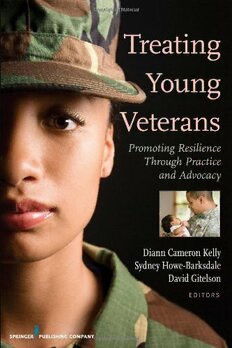
Treating Young Veterans: Promoting Resilience Through Practice and Advocacy PDF
383 Pages·2011·1.979 MB·English
Most books are stored in the elastic cloud where traffic is expensive. For this reason, we have a limit on daily download.
Preview Treating Young Veterans: Promoting Resilience Through Practice and Advocacy
Description:
The editors of Treating Young Veterans and the authors of the individual chapters [provide] practitioners with essential information about the needs, desires, and possibilities for veterans and their families. This book represents a thoughtful, sensitive, and sensible approach to working with military personnel and veterans who have been deployed to wars in the Persian Gulf, Iraq, and Afghanistan. Peter B. Vaughan Dean, Graduate School of Social Service (From the Foreword) Fordham University, New York, NY Many veterans unsuccessfully attempt to self-manage their mental and physical health needs. This volume examines the multiple challenges awaiting the new generation of young veterans returning to civilian life, and provides strategies for mental health professionals to assist them in the process of readjustment. It incorporates multidisciplinary, state-of-the-art research to present practice and advocacy opportunities that facilitate a healthy and socially engaged reintegration into society for both traditional veterans (enlisted and career military personnel) and nontraditional veterans (reservists, national guardsmen, and women) aged 18 to 40 years. The volume is divided into three sections: Assessment and Practice Approaches to Promote Resilience; Outreach and Practice With Special Communities, and Advocacy Practice to Promote Young Veterans' Well-Being. Each section includes an introduction highlighting the chapters, and an epilogue delineating important steps in practice, outreach, and advocacy. Key Features: Targets the specific needs of veterans of the Iraqi and Afghani conflicts Includes chapters on women and sexual trauma in the military and homeless combat veterans Addresses the special needs of children of veterans and the nature of ambiguous loss as "veteran-by-proxy," employment issues, and equity issues related to reservists Authored by recognized experts including military officers, attorneys, and Veterans Affairs administrators Designed for both general and scholarly readers
See more
The list of books you might like
Most books are stored in the elastic cloud where traffic is expensive. For this reason, we have a limit on daily download.
